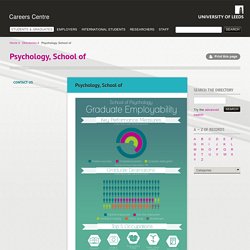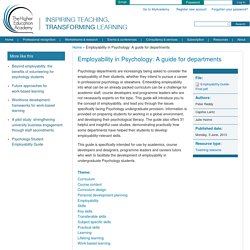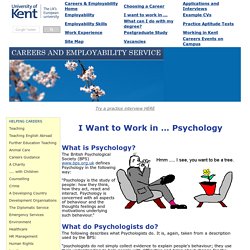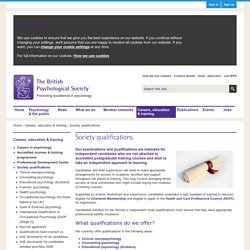

Downloads. Downloads. PsychologyCareers Booklet 16Sep2015 WEB version. Psychology, School of. Psychology, School of Key measures: Positive Outcomes: 96.1%, Graduate prospects: 67.7%, Graduate employment: 61.2%

What can I do with my degree in psychology? Studying psychology gives you a broad range of skills that span both science and the arts and opens up opportunities with a wide variety of employers Job options Jobs directly related to your degree include: Jobs where your degree would be useful include: Remember that many employers accept applications from graduates with any degree subject, so don't restrict your thinking to the jobs listed here.

Psychology degree career options. Psychology students are good all-rounders.

They tend to be inquisitive and analytical, and are happy tackling both ‘big picture’ issues and fine detail. They tend to have good social skills and be comfortable dealing with others. This guide should help you think about the skills you have, the jobs they can be applied to, and the options available. Here are some of the skills you should have acquired: What can I do with a psychology degree? Skills Your head might be crammed full of useful (and some not-so-useful) information, but your psychology degree will also help you to develop a wealth of useful skills… Analytical Skills You’re better than Shearer and Hansen put together.

You’re even better than Gary Neville. Fortunately, your top-notch analytical skills also extend beyond the world of football punditry. Communication (Oral) All mouth, no trousers? Communication (Written) What can I do with my psychology degree? Psychology has consistently been one of the most popular university courses in the UK.

According to UCAS, in 2007 there were around 80,000 applications for psychology degrees and this number has since risen steadily to 106,000 in 2014. The spike in tuition fees appears to have done nothing to deter psychology applicants in the last few years; the latest reports still show social studies are high in demand for undergraduates.What this data doesn’t tell us is the other side of the story. Many psychology graduates finish university feeling uncertain about what to do next. Sure, you could go on to study further and eventually become a qualified psychologist, but this isn’t necessarily the only option. Many people change dramatically whilst at university and discover that what they thought was a great career option at age 18 isn’t quite what they see themselves doing post-university.
. · Natalie Portman (actress)· Benjamin S. HealthSocialCare psychology. Employability in Psychology: A guide for departments. Psychology departments are increasingly being asked to consider the employability of their students, whether they intend to pursue a career in professional psychology or elsewhere.

Embedding employability into what can be an already packed curriculum can be a challenge for academic staff, course developers and programme leaders who are not necessarily experts on the topic. This guide will introduce you to the concept of employability, and lead you through the issues specifically facing Psychology undergraduate provision. Information is provided on preparing students for working in a global environment, and developing their psychological literacy.
The guide also offers 31 helpful and insightful case studies, demonstrating practically how some departments have helped their students to develop employability-relevant skills. The Higher Education Academy Official Site. The Higher Education Academy Official Site. Psychology Specialisms. Careers in Psychology. Your journey into psychology.
Your_journey_web_0.pdf. BPS careers guides. Careers in the psychological therapies. One in four people will suffer from a mental illness at some point in their lives. This can range from mild conditions, such as anxiety, to severe depression or more rare and complex conditions such as bipolar disorder. If you work in the psychological therapies, you could help people cope with problems as diverse as drug or alcohol addiction, eating disorders, family breakdown or bereavement. Psychology Careers. What is Psychology?

The British Psychological Society (BPS) www.bps.org.uk defines Psychology in the following way: “Psychology is the study of people: how they think, how they act, react and interact. Psychology is concerned with all aspects of behaviour and the thoughts feelings and motivations underlying such behaviour.” What do Psychologists do? The following describes what Psychologists do. Careersinpsychology. Clearing House for Postgraduate Courses in Clinical Psychology - Home. Welcome to the Clearing House website where you will find information about clinical psychology courses in Great Britain and about how to apply.

We welcome applications from people from ethnic minority backgrounds, from people with disabilities and from men as these groups are currently under-represented in the profession. Our website has five sections. We suggest starting with the Basics section as this covers the areas people most often ask about. Basics includes Entry requirements Funding Numbers of places Equal opportunities numbers International applicants Applicants with disabilities Criminal records and other checks Data protection Course Centres includes. PsychologyMastersProgrammesJan17. Bpsqualificationsinpsychology. Accredited Courses. Society qualifications. Our examinations and qualifications are intended for independent candidates who are not attached to accredited postgraduate training courses and wish to take an independent approach to learning.

Candidates and their supervisors will need to make appropriate arrangements for access to academic facilities and support throughout the period of training. This may involve arranging library access at local universities and might include buying into modules of training courses. Supported by events, workshops and supervision, candidates undertake a high standard of training to become eligible for Chartered Membership and eligible to apply to the Health and Care Professions Council (HCPC) for registration.
Candidates enrolled for the Society’s independent route qualifications must ensure that they have appropriate professional liability insurance. What qualifications do we offer? We currently offer qualifications in the following areas: Applicants from outside the UK Dyslexia guidelines. About the Research Interests Database. The Society is keen to provide postgraduates and researchers with direct access to information on the research interests of academics and researchers in psychology in the UK.

The database may be searched using the keyword facility to identify researchers and academics working in a specific field of psychology. A link to either the individuals or their departments webpages is provided wherever possible. This is a revised version of the previous database, with an increased number of entries and improved functionality. Go to the Research Interests Database. Related professions. There are some related professions that are associated with psychology. These include: Counselling An umbrella term covering a range of talking therapies such a cognitive behavioural therapy, psychodynamic therapy, and person-centred therapy. Counselling is a way of exploring the thoughts and feelings that may be causing difficulties in your life. There are a number of recognised but distinct methods of counselling.
Cpsychol_brochure_web.pdf. Graduate member (MBPsS) Becoming a Graduate Member of the Society is the starting point to your career as a psychologist. Graduate Basis for Chartered Membership (GBC)is an entry requirement for many Society accredited postgraduate training courses and is required for entry to all accredited Stage 2 and Doctoral programmes as part of the route to becoming a Chartered Psychologist.
The GBC is awarded through a successful application to become a Graduate Member of the Society. Eligibility UK applicants for graduate membership and the GBC require an undergraduate honours degree at a minimum lower 2nd class honours level which is accredited by the Society or alternatively an accredited conversion course. BPS. Awards & grants. The Society makes a number of awards available each year to recognise excellence in research, practice teaching and education in psychology.
They range from awards for A Level students to those marking achievement over the length of a professional career. A few awards are for our members only, but many are open to all psychologists working within the UK. Awards Professional Practice Board.